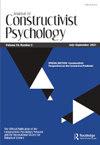民粹主义者如何在COVID-19大流行期间构建公共自我:以捷克总理为例
IF 0.7
4区 心理学
Q3 PSYCHOLOGY, CLINICAL
引用次数: 0
摘要
本文从心理学的角度分析了一位民粹主义领导人在新冠肺炎疫情期间的国家危机时期的自我呈现,考察了他向听众呈现的叙事。本文运用对话自我理论(DST)的建构主义方法,分析了捷克总理巴比斯在2019冠状病毒病第一波大流行期间在其Facebook个人资料中发表的演讲中出现的“我”立场。这些发现与现有的关于民粹主义自我表现的文献一致,强调了领导者将自己构建为响应性和原型,正如社会身份方法所期望的那样,并采用超个人的在线交流模式。此外,根据我们的结果,我们建议将DST扩展到分析民粹主义政治家与人民的关系可能是有用的。在这些位置上,政治家与外群体的关系就好像他们是内群体的成员一样,反之亦然。这种定位可能反映了公众人物试图与普通人建立联系的潜在世界观。总体而言,我们的研究表明,DST为政治民粹主义领域的进一步研究提供了一个有用的框架。本文章由计算机程序翻译,如有差异,请以英文原文为准。
How Populists Construct Public Selves during the COVID-19 Pandemic: A Case Study of the Czech Prime Minister
Abstract This paper adopts a psychological perspective to analyze the self-presentation of a populist leader in times of a national crisis during the COVID-19 pandemic, examining the narrative he presents to his audience. Using a constructivist approach of the Dialogical Self Theory (DST), we analyze I-positions emergent in speeches by Czech Prime Minister Babis released on his Facebook profile during the first wave of the COVID-19 pandemic. The findings are consistent with existing literature on populist self-presentation, highlighting that the leader constructs himself as being responsive and prototypical, as expected by the Social Identity Approach, and employs a hyper-personal model of online communication. Furthermore, we suggest, based on our results, that it might be useful to extend the DST to analyze how populist politicians relate to the people. In these positions, the politician relates to the out-group as if they were an in-group member or vice versa. This positioning might reflect the underlying worldview of public figures that try to relate to the common people. Overall, our research shows that the DST serves as a useful framework for further research in the area of political populism.
求助全文
通过发布文献求助,成功后即可免费获取论文全文。
去求助
来源期刊

Journal of Constructivist Psychology
PSYCHOLOGY, CLINICAL-
CiteScore
2.40
自引率
0.00%
发文量
22
期刊介绍:
Psychology and related disciplines throughout the human sciences and humanities have been revolutionized by a postmodern emphasis on the role of language, human systems, and personal knowledge in the construction of social realities. The Journal of Constructivist Psychology is the first publication to provide a professional forum for this emerging focus, embracing such diverse expressions of constructivism as personal construct theory, constructivist marriage and family therapy, structural-developmental and language-based approaches to psychology, and narrative psychology.
 求助内容:
求助内容: 应助结果提醒方式:
应助结果提醒方式:


